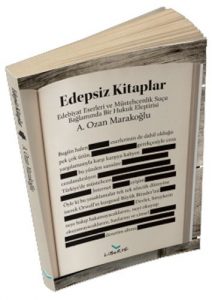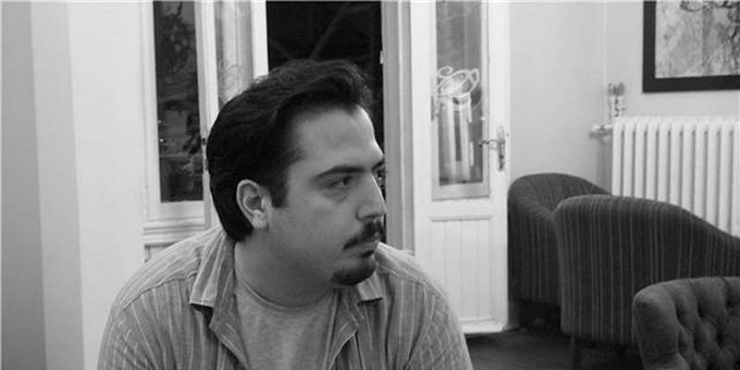In the last year only, at least 13 books have been declared obscene by the Board for the Protection of Minors from Sexually Explicit Materials in Turkey, authors and translators have been tried and even sentenced because of the ‘crime’ of obscenity. Well, how can we evaluate the “accusation of obscenity” faced by many written, visual and verbal products, including literary works composed of fictional plots and characters, and the understanding of law on which this crime is based?
In order to answer these questions wetalked to A. Ozan Marakoglu about the crime of obscenity, which he dealt with in detail in his book Nasty Books: a Legal Criticism in the Context of Literary Works and Obscenity, how this crime affects freedom of expression, and through which legal mechanisms freedom of expression can be ensured.
“OBSCENITY IS A LEGALLY PROBLEMATIC TYPE OF CRIME DUE TO THE FACT THAT ITS DEFINITION CANNOT BE MADE”
As a lawyer, can you tell us the reason and the story of your decision to work on the “crime of obscenity” and especially the prosecution of literary works for this crime?
It had been a year or two since the Turkish Penal Code No. 5237 came into force at the time when I had to choose my postgraduate thesis subject. In the same period, news about literary texts that were subject to prosecution on the grounds of obscenity in the media caught my attention. A postgraduate thesis must have a problem, a question, an argument and it should be original. Obscenity is a legally problematic type of crime as it cannot be defined. The fact that literary works are still subject to criminal proceedings for this crime adds to the problem. Dealing with the expert reports of the Board for the Protection of Minors from Sexually Explicit Materials as a field study on the subject also provided the connection with the study area of the Istanbul University Forensic Medicine Institute, for which I wrote the thesis. In addition, until that time, no thesis was written in the academy that dealt with the crime of obscenity in such a context and with a critical point of view. Therefore, I thought that it would be a great topic for a postgraduate thesis and moreover, it would be very suitable for me. After completing the thesis, this time the process of converting the thesis into a book began, which took several years.
At the beginning of your book, you quote from Cemal Bali Akal as follows:
“A legist is a person who can be dangerous. He writes expert’s report, presents the indictment, decides, defends; he also attends the lesson by the way. In other words, he shapes people’s future. And he can perform this role within a pitifully narrow framework, as can be seen in countless examples. He may be so blind and ignorant to the extent that he has no horizon or no awareness of the clouds. He may not realize that the truths, values, understanding of law and justice, political judgments and social views, which he considers infallible, may soon lose their validity, even become ridiculous and take him into a tragic-comic position, but more importantly, how much harm he can do to others.”
I would like to ask a question about the issue of “looking at the horizon” mentioned in the quote. Currently, while the practices regarding the obscenity crime have increased so much in Turkey, do the legists have a discussion on this issue, how much is the legal theory discussed in the context of obscenity in Turkey?
There is no such discussion among legists that I know of. However, in a country where legal problems are so many and varied, it may be wrong to blame legists for this reason. Turkey’s (legal/political) agenda is so busy that it leaves no opportunity to discuss these issues. As an academic study on the subject recently, I can cite Dr. Faruk Turinay’s article “Literary Works in Terms of the Unlawful Element of Obscenity Crime“.
How is “obscenity” defined within the law?
Although certain criteria and tests have been tried to be introduced in both Turkish and foreign laws, there is actually no specific definition of obscenity. This is the root of the whole issue. Obscenity is a concept that can change from society to society, between communities within the same society, between individuals within the same community, at various periods of a single individual’s own life.
 One of the points you highlight in your book is the principle of the legality of the crime, that is, the crime – for example, the crime of obscenity – should be defined clearly and unambiguously within law. What importance does this principle have for protecting individual rights and freedoms? What are the consequences of the ambiguity of the crime in cases of obscenity?
One of the points you highlight in your book is the principle of the legality of the crime, that is, the crime – for example, the crime of obscenity – should be defined clearly and unambiguously within law. What importance does this principle have for protecting individual rights and freedoms? What are the consequences of the ambiguity of the crime in cases of obscenity?
The principle of legality of the crimes, which is one of the basic principles of criminal law, is an assurance to the individual against the state that makes the penal law. Thanks to the clear and unequivocal definition of the crime, the individual will be sure whether s/he will face a criminal trial tomorrow for what s/he has done while carrying out her/his actions. The ambiguity of the definition of crime to an extent that cannot be determined, on the other hand, eliminates predictability. Therefore, it carries the permanent risk of punishment over freedom of expression. The uncertainty of the crime of obscenity causes exactly this.
Has the absence of the principle of legality of crime been used defensively in any obscenity cases before, and has it worked?
Claiming that the crime of obscenity violates the principle of legal certainty in a case also means asserting that this article of the Turkish Penal Code is unconstitutional. Therefore, when you express this in a lawsuit, there will be a possibility that the issue will be discussed in the Constitutional Court through an objection to the unconstitutionality.
In the objection of Aydın 3rd Criminal Court of First Instance, which is the subject of the Constitutional Court decision no. 2015/35, it was asserted that the expression “unnatural intercourse”, which refers to one of the qualified cases in Article 226 of the Turkish Penal Code, which includes the crime of obscenity, is contrary to the principle of certainty. However, the Constitutional Court decided that the expression in question did not violate the principle of certainty.
Therefore, even if such a process is carried out for the concept of pure obscenity, that is, even if the local court takes the matter to the Constitutional Court, I unfortunately predict that a similar decision will be made. On the other hand, there are arguments that the prosecuted texts are literary works and should benefit from the protection of freedom of expression, rather than that the crime of obscenity violates the principle of legality.
“IN THE REPORTS OF THE COMMITTEE OF PROTECTION, THE EMPHASIS MADE TO THE TURKISH SOCIETY’S APPROACH OF CHASTITY HIGHLIGHTS THE BENEFITS WHICH ARE TRIED TO BE PROTECTED”
In your book, you emphasize that the primary purpose of law and punishment is to protect individual freedoms and that’s why the definition of the crime should be explicit, and also what exactly the punishment serves to protect individuals from should be clear. Is it clear what the punishments regarding obscenity aim to protect? Considering the committee’s decisions, what are those tried to be protected?
In the justification of the Article 226 of the Turkish Penal Code, in which the crime of obscenity is described, it is written that the purpose of this crime is to protect children. On the other hand, the seventh chapter of the law, under which the crime is indicated, is titled “Crimes Against Public Morality.” So, it seems that what is wanted to be protected is not the child’s psycho-sexual development, but rather the child’s morality.
Mentioning some of the phrases used in the expert reports of the Committee for the Protection of Minors from Sexually Explicit Materials will also give an idea. Often the following expressions are used: “. . . Since their primitive years till today, people have come to practice keeping the genitals closed and secrecy of sexual intercourse as an indispensable rule in every part of the world and in every society. This is the same in our society. The moral understanding and rules of our society and their customs do not accept the obviousness of sexual intercourse.”
It should be pointed out that while nudity is condemned in the statements here, it actually contradicts the decision of the Supreme Court of Cassation that at the time mere nudity alone would not be sufficient to constitute the crime of obscenity. Similarly, the emphasis on the understanding of chastity in Turkish society in the reports of the Committee for the Protection of Minors from Sexually Explicit Materials reveals the benefit that is sought to be protected.
You criticize the legal existence of obscenity as a crime. What is the reason for this?
I am in favor of limitation to an arrangement based on the protection of children and the those who are vulnerable and open to abuse. Pornographic products aimed solely at sexual satisfaction should also be free, unless they are shown directly to children or children are used as a material in it.
In its current form, the law penalizes not only the display of “obscene” products to children, but also the sale of them in such a way that their content can be understood by anyone who sees them in the first sight. This extends the scope of the crime to an unlimited extent. This is how literary texts are affected by this crime.
It should be pointed out that in the Article 226, literary and artistic works are excluded from the scope of this article, provided that they are prevented from the access of children and that they do not use children or people who appear to be children in their production. But this time, the question of what constitutes a work of literary arises, it should be kept in mind that Elfriede Jelinek, the author of the Pianist, which the Committee for the Protection of Minors from Sexually Explicit Materials did not consider a literary work at the time, and moreover, said that “he applied to unskillful expression styles”, received the Nobel Prize for Literature two years later.
Currently, books that contain any expression about LGBTI+s are declared as obscene, while in the past, “alienation from marriage” was also considered obscene. In your book, you mention that the definition of obscenity and the benefit of punishing this “crime” vary according to the glasses of the viewer. How did these glasses change in the process in Turkey, what were considered as obscene?
The sentence in the book mentioning that obscenity change according to the viewer’s glasses belongs to criminal law professor Duygun Yarsuvat. Considering the lawsuits filed against literary works in Turkey, the books of many authors such as Hüseyin Rahmi Gürpınar, Melih Cevdet Anday, Sevgi Soysal, Pınar Kür, Rıfat Ilgaz are tried and confiscated on the grounds of obscenity. It may seem strange that these authors, whose texts are in schoolbooks today, should face such proceedings.
In the last few years, I have observed a trend towards judging children’s books for obscenity or finding them obscene. Some books that aim to improve the child’s sexual education, healthy psycho-sexual development or social gender awareness were affected by this simply because they used expressions such as homosexuality and transgender. Of course, even though there are some changes at the social level, some things can remain the same in the state’s reaction. Buket Uzuner’s book, which was first published in 1986, was found obscene 34 years after its publication. Books that were found obscene in the past and were convicted for obscenity cannot be sold today without the 18+ inscription. For example, today Filiz Bingölçe’s Feminine Slang Dictionary (Kadın Argosu Sözlüğü) is on sale with such a inscription, and it’s a dictionary – as befits the name. Therefore, I can not make a comment on how the glasses of individuals and the society changed, but I think we cannot say that much has changed in terms of those who hold the whip hand to intervene.
“THE CRIME BEING AN ABSTRACT DANGER CAUSES OBSCENITY TO HANG LIKE THE SWORD OF DEMOCLES OVER THE HEAD OF LITERATURE TEXTS”
What are the differences between the obscenity crime in the old Turkish Penal Code No. 765 and the Turkish Penal Code No. 5237 that came into force later on? Is it possible to consider these differences as legally positive or, on the contrary, did they cause more problematic consequences?
The previous law recognized “injuring the people’s feelings of shame and modesty, or inciting and abusing sexual desires” as a crime. In the new Turkish Penal Code, presenting and publishing obscene products in a way that can reach children, etc. is considered a crime. This is of course a positive development, even on paper. On the other hand, in the new law, there is an emphasis on public morality due to the title of the crime. In the text of the previous law, the article was poorly written and the products as the subject of the crime were listed at length as “Every kind of book, newspaper, booklet, magazine, document, advertisement, picture, poster, record …”. A bad method in terms of law-making technique. In the new law, a more technically correct way was preferred by using the phrase “obscene images, texts and words”.
It is also a positive difference that in the new law, products related to sexual behavior with children, animals and dead bodies are considered qualified. Another positive difference is that literary and artistic works are excluded from the scope of this article, provided that they do not use children and are prevented from the access of children. However, it is clear that this provision in the article is not sufficient in practice.
It is the new text that is the least-worst in the text of the two laws. However, the equivocality of the concept of obscenity, and the existence of other ambiguous expressions such as “unnatural sexual intercourse” cannot save the new law from being problematic when evaluated together with its implementation.
How was the article that ensures that the articles on obscenity cannot be applied to literary, artistic and scientific works added to the law, what kind of a discussion/demand/need resulted in introduction of this new law and what is the idea behind it?
Here, I think there was a good faithed approach in preparing the law. The aim is to protect the freedom of scientific and artistic expression. Because, if we see a product in another medium, we can regard it as “pornographic” but when it is in a work of art or literature, we regard it as aesthetic. The first example that comes to my mind is the Origin of the World painting by Gustave Courbet, which depicts female genitalia. Since a photograph of that painting was included in Enis Batur’s novel Apple, the book had to stand trial. Therefore, the purpose of this provision of the article is not to expose literary and artistic works to prosecution on the grounds of obscenity. But the fact that the crime is an abstract danger crime, that is, obscene products not only being shown to a child, but also including actions such as offering for sale, publishing, etc. in a way that the content can be understood, causes obscenity to hang like a Damocles sword over the head of literary texts. Of course, another issue is what is a work of literature and art and what is not. When these reasons are combined, literary works cannot escape from being tried even if the purpose of the legislator is well-intentioned.
How is it decided whether a book/product is a work of art or a literary work and therefore can be prosecuted for obscenity? What is the role of the Committee of Sexually Explicit Material in this process?
For this, the product is sent to experts. Experts examine the work and decide whether it is a literary work or not. The courts also follow what the experts say. One of the duties of the Committee for the Protection of Minors from Sexually Explicit Materials is to act as an expert in the courts. Therefore, the products are also sent to the committee. In Turkey, there is a “expert justice” problem, which is frequently mentioned by legists. Although the expert report is not binding for the judges, unfortunately, things do not work like this in practice.
“I DON’T THINK THAT THE COMMITTE FOR PROTECTING MINORS FROM SEXUALLY EXPLICIT MATERIALS IS NECESSARY EVEN IN THE MOST IDEAL STRUCTURE EVER”
While you criticize the existence of the crime of obscenity in law, you are both making a legal criticism and criticizing how literature is defined within the law, right? I understand that you criticize the assignment of a certain moral teaching to literature. Could you detail this a little bit?
The literary text does not have to be moral. As Oscar Wilde said, “There is no such thing as a moral or an immoral book. A book is either well written or badly written.” For example, recently, one of the stories in a storybook included pedophile scenes with a baby, then it was lynched on Twitter, and then a lawsuit was filed against the author of the book. The story was so disturbing that I didn’t even read the rest of it. But the author may aim just that, that is, to disturb the reader. The actual character in the story may be a pedophile, a murderer, a rapist, a disgusting character, a character we would like to spit in his face in real life. A text should not be penalized on this basis. Otherwise, Dostoevsky could not have written Crime and Punishment.
Can we say that obscene publications and related laws and institutions override freedom of expression and artistic expression?
Unfortunately we can say that. And it is the Constitutional Court itself that says this. In the application made by İrfan Sancı, the publisher of William Burroughs’ book, the Soft Machine, who was tried for obscenity, the Constitutional Court decided that the freedom of expression had been violated. The ECHR has similar decisions.
Finally, what do you think is the legal way to ensure freedom of expression? Is it a change in the functioning of the Committee for Sexually Explicit Materials, or a radical change or abolition of the Committee or the law?
The most basic thing that can be done legally here is, first of all, an arrangement aimed at protecting children and vulnerable segments and the ones open to abuse. This is not possible with a concept like “obscene” which is ambiguous and refers to moral values. As long as children and vulnerable groups are not abused, that is, as long as we are not talking about products such as child pornography, the state should not interfere with who reads what and what they look at. Maybe removing the crime from being an abstract danger crime, as I mentioned above, can be a solution. On the other hand, expressions such as “unnatural sexual intercourse” whose purpose is unclear should not be included in the text of the law. On the other hand, I do not think that the Committee for the Protection of Minors from Sexually Explicit Materials is necessary even in the most ideal structure.





